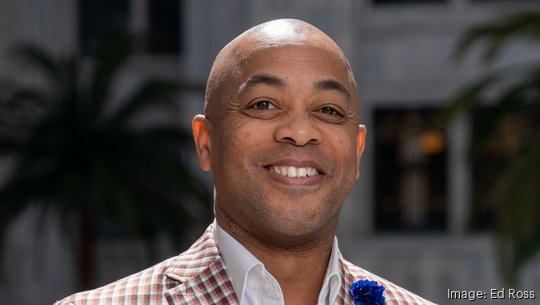
The entity that would become Cary startup Core Ai Corp. really started with a pink slip, a $22,000 savings account and a lot of uncertainty.
Flash forward to today and the firm has new validation as one of five companies picked for the first iteration of the Black Founder Accelerator program this year. The Black Founder Accelerator program, a partnership between Northwestern Mutual and gener8tor, could mean a $100,000 investment for Core Ai, the only North Carolina company in the cohort.
2023 is a challenging market for any startup – but particularly for those with Black founders, statistics show. Data from Crunchbase shows Black startup founders in the U.S. raised just under $2.3 billion of the $215.9 billion in U.S. venture capital allocated last year – about 1 percent.
But with the backing of the Black Founders Accelerator program, which announced its picks early Thursday, Core Ai co-founder and CEO Ed Ross plans to defy the odds.
In an interview, Ross tells Triangle Inno what led him to develop Core Ai, a digital coaching platform intended to empower leaders to engage their teams with curated insights – and why he was willing to bet his family’s savings account to make the company a reality.
Core Ai, founded in 2020 by Ross and James Lackland, describes itself as a conversational analysis platform that helps leaders get real-time insights into their employee development conversations. It was boostrapped initially, later adding about $187,000 from friends and family. The accelerator Core Ai was accepted to this week could add in another $100,000.
The seeds of the company where planted when Ross's then-employer, Siemens, downsized in 2011 and Ross lost his job. He remembers coming home to his wife and two young children.
“I said, 'I want to start my own company,'” he said.
Ross wasn’t sure of the business plan. He wasn’t sure of the pain point. But he wanted to be in control of his own career – and his wife was in full support, eventually allowing him to use the $22,000 in their savings account to launch the company “as long as you promise to give it back.”
Initially, Ross turned to consulting, leveraging his network. His largest project was directing a sales team of 186. It was a challenge that had him asking how employers should manage their time. How much time should they pour into their employees?
It’s a question that became the genesis of Core Ai’s direction.
In 2019, Ross was approached by a global health care company asking to build a sales process for its sales organization. Six weeks later, they asked to hire Ross to “coach our managers in the application of this process.”
Within 10 months, the company told him the process had helped its managers be more effective – so effective that they had secured $21 million in revenue, Ross said. The contract was secured for another year. But it was tough going, as Ross at the time was an entity of one.
“We started to think about how we can scale,” he said. “That’s how we started pouring resources into the platform known as Core Ai.”
Core Ai recently finished its first phase of development and is moving into its beta round, Ross said. One of its early customers signed an open purchase order for when the product is ready.
“We haven’t activated it yet,” Ross said. “I’m a sales guy. It doesn’t count until we have a check in the bank.”